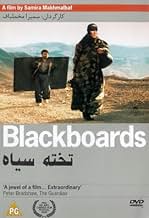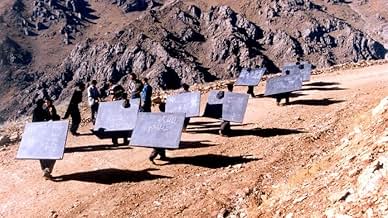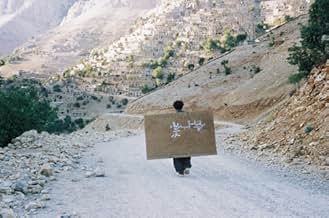Kurdish teachers Said and Reeboir roam Iranian villages near Iraqi border during war. Said guides displaced men, marries widow Halaleh. Reeboir joins child smugglers. Amid danger, they try t... Read allKurdish teachers Said and Reeboir roam Iranian villages near Iraqi border during war. Said guides displaced men, marries widow Halaleh. Reeboir joins child smugglers. Amid danger, they try teaching nomadic students while soldiers patrol.Kurdish teachers Said and Reeboir roam Iranian villages near Iraqi border during war. Said guides displaced men, marries widow Halaleh. Reeboir joins child smugglers. Amid danger, they try teaching nomadic students while soldiers patrol.
- Awards
- 3 wins & 3 nominations total
- Director
- Writers
- All cast & crew
- Production, box office & more at IMDbPro
Storyline
Did you know
- ConnectionsFeatured in Samira cheghoneh 'Takhté siah' rol sakht (2000)
Featured review
BLACKBOARDS is a human story - an arduous one at that. It affirms the tenacity of human spirits. Its hard medicine content could be uneasy for some to bear. At its core, there is warmth a-glowing beneath it all. Writer-director Samira Makhmalbaf is a true artist - she included subtle visual poetic accents. Shooting along the rugged terrain of Kurdistan, nearing the border between Iran and Iraq, it's barren of vegetation, full of treacherous rocks as people traverse the steep mountain paths and windy troughs. I really appreciate a particular detail scene: from the held wide-shot of a group of teachers with blackboards strapped to their backs, standing abreast at a mountain road clearing - paused, camera quietly cuts to a close-up of a pair of feet with 'billowing' fabric of the trousers. We need no sound effect of whistling wind, the shot was at once poetic and effective. How succinct and direct in expressing the moment, Samira did.
For a 20-year old woman Iranian director in her second feature film, Samira Makhmalbaf is awesome - sensitive, perceptive, mature in her viewpoint, with bold persistence against all odds to complete her project. Keen awareness of the state of affairs her film is focused on - not so much as making a political statement, she's more in earnest depicting simple everyday things: the mundane human needs of the wandering Nomads yearning to be home; the young 'mule' boys struggling for meager living yet looking out for each other; teachers seeking pupils in exchange for food. It's philosophical: through the course of the journey, the fate of the blackboards goes through transitions as situations demand - even "let go." Survival and adaptability co-exist.
Samira has a good mentor - her father Mohsen Makhmalbaf, who is a collaborator on the writing of "Blackboards" and her first feature, "Apple, The" 1998 (a bold unique storytelling in docu-drama format). She also has the expert assistance of cinematographer Ebrahim Ghafori, who previously worked with her on "Apple." Bahman Ghobadi is the actor who portrayed the teacher who ran into the expedition of the young 'mule' boys with contraband goods on their backs. He was the writer-director-producer of the film "A Time for Drunken Horses" 2000, and here in "Blackboards," it's déjà vu - this time is not of snowy setting, but included brief dramatic storyline between him and the boys. Reality is still bitter truth, but Samira kept the element of humanity intact.
Other efforts from the Makhmalbaf family include: "Day I Became A Woman, The" 2000 by Marzieh Meshkini, Mohsen's wife. "How Samira Made the Blackboards" (it'd be interesting to see how Samira shot the film in such arduous circumstances and with mostly non-professional cast with wide age differences) by Mezssam Makhmalbaf, Samira's brother. Father Mohsen Makhmalbaf did "Gabbeh" 1996 and "Kandahar" 2001.
More Iranian films? Try writer-director Majid Majidi's "Baran" 2001 - a poignant story about a young man (17-year old) in Tehran, how he matures through his deeds in trying to help an illegal Afghan of a poor family - it's a rich human story from the filmmaker who gave us "Color of Paradise" 2000 and "Children of Heaven" 1999.
For a 20-year old woman Iranian director in her second feature film, Samira Makhmalbaf is awesome - sensitive, perceptive, mature in her viewpoint, with bold persistence against all odds to complete her project. Keen awareness of the state of affairs her film is focused on - not so much as making a political statement, she's more in earnest depicting simple everyday things: the mundane human needs of the wandering Nomads yearning to be home; the young 'mule' boys struggling for meager living yet looking out for each other; teachers seeking pupils in exchange for food. It's philosophical: through the course of the journey, the fate of the blackboards goes through transitions as situations demand - even "let go." Survival and adaptability co-exist.
Samira has a good mentor - her father Mohsen Makhmalbaf, who is a collaborator on the writing of "Blackboards" and her first feature, "Apple, The" 1998 (a bold unique storytelling in docu-drama format). She also has the expert assistance of cinematographer Ebrahim Ghafori, who previously worked with her on "Apple." Bahman Ghobadi is the actor who portrayed the teacher who ran into the expedition of the young 'mule' boys with contraband goods on their backs. He was the writer-director-producer of the film "A Time for Drunken Horses" 2000, and here in "Blackboards," it's déjà vu - this time is not of snowy setting, but included brief dramatic storyline between him and the boys. Reality is still bitter truth, but Samira kept the element of humanity intact.
Other efforts from the Makhmalbaf family include: "Day I Became A Woman, The" 2000 by Marzieh Meshkini, Mohsen's wife. "How Samira Made the Blackboards" (it'd be interesting to see how Samira shot the film in such arduous circumstances and with mostly non-professional cast with wide age differences) by Mezssam Makhmalbaf, Samira's brother. Father Mohsen Makhmalbaf did "Gabbeh" 1996 and "Kandahar" 2001.
More Iranian films? Try writer-director Majid Majidi's "Baran" 2001 - a poignant story about a young man (17-year old) in Tehran, how he matures through his deeds in trying to help an illegal Afghan of a poor family - it's a rich human story from the filmmaker who gave us "Color of Paradise" 2000 and "Children of Heaven" 1999.
- How long is Blackboards?Powered by Alexa
Details
Box office
- Gross US & Canada
- $23,520
- Opening weekend US & Canada
- $3,416
- Dec 8, 2002
- Gross worldwide
- $41,772
Contribute to this page
Suggest an edit or add missing content




















